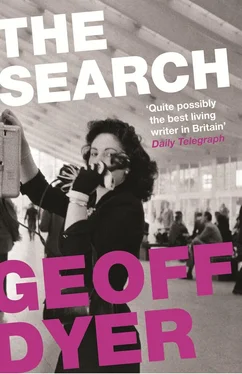Geoff Dyer - The Search
Здесь есть возможность читать онлайн «Geoff Dyer - The Search» весь текст электронной книги совершенно бесплатно (целиком полную версию без сокращений). В некоторых случаях можно слушать аудио, скачать через торрент в формате fb2 и присутствует краткое содержание. Год выпуска: 2013, Издательство: Canongate Books, Жанр: Современная проза, на английском языке. Описание произведения, (предисловие) а так же отзывы посетителей доступны на портале библиотеки ЛибКат.
- Название:The Search
- Автор:
- Издательство:Canongate Books
- Жанр:
- Год:2013
- ISBN:нет данных
- Рейтинг книги:3 / 5. Голосов: 1
-
Избранное:Добавить в избранное
- Отзывы:
-
Ваша оценка:
- 60
- 1
- 2
- 3
- 4
- 5
The Search: краткое содержание, описание и аннотация
Предлагаем к чтению аннотацию, описание, краткое содержание или предисловие (зависит от того, что написал сам автор книги «The Search»). Если вы не нашли необходимую информацию о книге — напишите в комментариях, мы постараемся отыскать её.
The Search — читать онлайн бесплатно полную книгу (весь текст) целиком
Ниже представлен текст книги, разбитый по страницам. Система сохранения места последней прочитанной страницы, позволяет с удобством читать онлайн бесплатно книгу «The Search», без необходимости каждый раз заново искать на чём Вы остановились. Поставьте закладку, и сможете в любой момент перейти на страницу, на которой закончили чтение.
Интервал:
Закладка:
The crowd was not uniformly dense and as long as you abandoned all volition and went where the crowd willed, a degree of movement was possible. After the crush around the food stalls Walker found himself in a less compacted part of the crowd. Stumbling through the undergrowth of feet which trod and tripped over his own, he took brief faltering steps. Up ahead a man was trying to manoeuvre his bicycle through the crowd — and there, right next to him, was Malory. The realization passed through Walker like a shock. It couldn’t be but it was, he was sure. The very randomness of the sighting, the almost instinctive recognition, was virtual proof of that. Walker yelled out above the hubbub of the crowd, ‘Malory!’ A dozen faces turned round, Malory’s among them. There was a brief surge and the faces turned immediately away. He yelled again and this time more people turned back — but not Malory, who seemed to be making an effort to move through the crowd. Walker shoved his way past the bodies in front of him. Malory was moving with the general flow of the crowd, not straining to get ahead but maintaining a steady ten yards between himself and Walker. Elbowing his way more aggressively, incurring curses and retaliatory shoves, Walker closed the gap to three yards. Malory continued moving forward, so calmly that the surrounding people would not have guessed he was trying to get clear of the figure barging and squirming behind him. The calm was deceptive, for Walker saw now that every time a slight gap opened in the crowd Malory used that opportunity to gain a few yards’ advantage. There was a ripple of shoving and stumbling ahead of Walker and he saw Malory abruptly stranded in a pack of bodies. The crowd formed contour lines which had bunched themselves tightly around Malory, but Walker was still able to move relatively easily. He barged through the scrum of bodies, his arms coming clear of the surface of shoulders like a swimmer’s. A wave of shoves passed through the crowd. Malory tottered but people were packed so tight around him that it was impossible to fall. Using his arms like a wedge and then slipping into the gap, Walker moved within two yards of Malory but here the crowd was so dense that no movement was possible. Panic was spreading. There was another shove from behind. Three people disappeared from sight, initiating a counter-surge which sent everyone lurching in the other direction. Walker lost his footing but was immediately wedged upright by the press of bodies from the other side. He glared round and joined in the shouts of recrimination, aware that by elbowing his way through the crowd he had helped set up the ripples and currents of panic which were threatening to engulf him. Malory was only a yard away. Walker’s arms were pinned by his side; if he could have raised them above the pack of people he could have reached out and touched his shoulder. For five minutes they remained like this, the crowd like a vast millipede, swaying on tiny legs which were always about to collapse beneath it. Surges and counter-surges rocked through the crowd until the crush began to ease. Malory moved a few steps and then another yard. Walker stumbled forward and then found himself penned in again. Moments later he was able to move, but all the time the distance between himself and Malory was increasing. It was like being in an ocean: currents and eddies, powerful rip-tides, sucked you in the opposite direction to that in which you wanted to go. This worked well for Malory, who moved whichever way the current took him, but for Walker it made the task of following him impossible. Where the crowd urged Malory in one direction, a few moments later it tugged Walker away in the other. Malory was ten yards clear now and it was impossible to beat a path through to him. There was another surge and Walker was swept further from Malory, forced to the other side of a row of parked cars. He felt a hard shove in the back. Stumbled and grabbed the shoulder of the woman in front, almost dragging her to her knees. He regained his balance and looked round but there was no sign of Malory in the spot where he had last seen him.
Monitoring footage of the scene, police gradually dispersed the crowd but Walker remained trapped for several hours more. By any normal standards it was still fantastically crowded but eventually he stumbled into his hotel, shocked by the empty expanse of the lobby.
He was exhausted, his muscles ached and his back and arms were bruised. Soaking in a bath he went over and over the day’s events until he began doubting whether it was actually Malory he had seen. And even if it had been, Walker was now as far away from him as ever. The fact that he had been within a yard of Malory meant nothing.
These doubts were reinforced the next day when he called Rachel. She had just spoken to a man in Port Ascension, a friend of Malory’s who was sure he had seen him there.
‘He wanted to know if I had a number for him.’
‘How long ago?’
‘I spoke to him this morning. Just a couple of hours ago. He left a number.’
Walker wrote the number down. ‘And what was the name of the town?’
‘Port Ascension. Do you think he might be there?’
‘It’s possible,’ he said absently. Ascension. . Ascension. He tried to place the name and then remembered: the ferry times in the newspaper. A coincidence — but without coincidence life didn’t happen. Coincidence was destiny broken down into its smallest unit.
‘Are you still there?’
‘Yes, sorry.’
‘You don’t sound very optimistic.’
‘I thought I saw him yesterday.’
‘You saw Alex?’
‘I’m not sure now. I could easily have been mistaken. The more I think about it the less sure I am. . I think of you a lot.’
‘I know. I’m smiling when I think of you, Walker.’
‘What does that mean?’
‘It means I like thinking of you.’ Walker smiled into the phone. They listened to each other breathing. A few seconds later they hung up.
CHAPTER SIX
The sea was rough, the boat smelled of oil and bad food. For as long as Walker could remember he had been disappointed by boats: something to do with the thickness of the metal, the size of the bolts; the way everything was covered in a thick skin of paint, the way you had to struggle through low self-closing doors, the way the toilets were always awash with water. He stood on deck and was surprised by how quickly he became bored watching the land receding, the frantic gulls. Even the sea was disappointing. Grey, cold.
He went below deck to get some food but everything looked too foul to eat. A smell of french fries and eggs emanated even from the bolognese sauce congealing in a brightly lit tin. He wandered to the lounge where people were already asleep on the floor — the seats all had arm-rests to prevent people stretching out on them. No effort had been spared to make the crossing as miserable as possible.
Soon people were vomiting all over the ship. The smell of sick was impossible to dissociate from the reek of the food cooking in the galleys. Walker thought he might throw up himself and went back on deck. The air was full of spray. To the disappointment of those lined up at the stern, cameras at the ready, darkness fell without a sunset.
Walker remained on deck and took a sounding — as he suddenly, under the nautical influence, began to think of the recordings he made with the dictaphone. Later, listening back to the recording, he was surprised to find how the sounds of gulls and wind, the slap of waves, evoked not the grim reality of the crossing but the romantic ideal of a sun-soaked cruise.
The boat docked at dawn the next morning. Walker joined a line of people shuffling towards immigration officials, borrowing pens to fill in disembarkation cards. ‘Purpose of visit’: Walker hesitated, scribbled ‘Tourism’ and gave the Grand Central Hotel — glimpsed over the shoulder of another passenger — as the place he would be staying. He waited at the yellow line until the port official waved him forward — the sullen, bored, omnipotent wave of frontier staff the world over. Walker said, ‘Hi,’ handed over his card, waited. Without looking up the guy consulted a huge log-book, let it fall shut and said, ‘Over there.’
Читать дальшеИнтервал:
Закладка:
Похожие книги на «The Search»
Представляем Вашему вниманию похожие книги на «The Search» списком для выбора. Мы отобрали схожую по названию и смыслу литературу в надежде предоставить читателям больше вариантов отыскать новые, интересные, ещё непрочитанные произведения.
Обсуждение, отзывы о книге «The Search» и просто собственные мнения читателей. Оставьте ваши комментарии, напишите, что Вы думаете о произведении, его смысле или главных героях. Укажите что конкретно понравилось, а что нет, и почему Вы так считаете.












